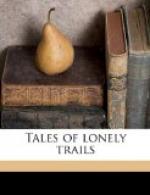One familiar feature of Arizona travel manifested itself to me that day—the dry air. My nails became brittle and my lips began to crack. I have had my lips cracked so severely that when I tried to bite bread they would split and bleed and hurt so that I could not eat. This matter of sore lips was for long a painful matter. I tried many remedies, and finally found one, camphor ice, that would prevent the drying and cracking.
Next day at dawn the forest was full of the soughing of wind in the pines—a wind that presaged storm. No stars showed. Romer-boy piled out at six o’clock. I had to follow him. The sky was dark and cloudy. Only a faint light showed in the east and it was just light enough to see when we ate breakfast. Owing to strayed horses we did not get started till after nine o’clock.
Five miles through the woods, gradually descending, led us into an open plain where there was a grass-bordered pond full of ducks. Here appeared an opportunity to get some meat. R.C. tried with shotgun and I with rifle, all to no avail. These ducks were shy. Romer seemed to evince some disdain at our failure, but he did not voice his feelings. We found some wild-turkey tracks, and a few feathers, which put our hopes high.
Crossing the open ground we again entered the forest, which gradually grew thicker as we got down to a lower altitude. Oak trees began to show in swales. And then we soon began to see squirrels, big, plump, gray fellows, with bushy tails almost silver. They appeared wilder than we would have suspected, at that distance from the settlements. Romer was eager to hunt them, and with his usual persistence, succeeded at length in persuading his uncle to do so.
To that end we rode out far ahead of the wagon and horses. Lee had a yellow dog he called Pups, a close-haired, keen-faced, muscular canine to which I had taken a dislike. To be fair to Pups, I had no reason except that he barked all the time. Pups and his barking were destined to make me hail them both with admiration and respect, but I had no idea of that then. Now this dog of Lee’s would run ahead of us, trail squirrels, chase them, and tree them, whereupon he would bark vociferously. Sometimes up in the bushy top we would fail to spy the squirrel, but we had no doubt one was there. Romer wasted many and many a cartridge of the .22 Winchester trying to hit a squirrel. He had practiced a good deal, and was a fairly good shot for a youngster, but hitting a little gray ball of fur high on a tree, or waving at the tip of a branch, was no easy matter.
“Son,” I said, “you don’t take after your Dad.”
And his uncle tried the lad’s temper by teasing him about Wetzel. Now Wetzel, the great Indian killer of frontier days, was Romer’s favorite hero.
“Gimme the .20 gauge,” finally cried Romer, in desperation, with his eyes flashing.




